Interview with Dr. José Lozán, University Hamburg, Co-editor of the GEO Book Series “Warning signs” to popularise science
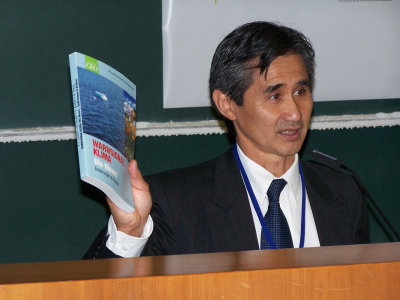
Dr. José Lozán is a long-term guest scientist from Peru working at the University of Hamburg. During his work at the university he has been particularly concerned with making the best science about water, the oceans and our climate available to young people and the public at large. The last public symposium he organised from 20 to 22 September 2011 was part of the high-level events of the now well-known Hamburg Climate Weeks. Mundus mariscontributed to the latest activities co-organised by Dr. Lozán and interviewed him to learn more.
MM: Dr. Lozán, you were one of the main organisers of the public climate conference in Hamburg in September 2011. What did the renowned scientist, you have attracted to speak at the event wanted to convey to the public as their most important findings?
A: This was indeed already the sixth Symposium, which I have organised under the motto "scientists inform the public directly". The aim was always for the public to learn first hand. Research produces results and gains new insights. The transfer of this information to the public, however, happens only passively. The scientific institutions tend to neglect this essential part of the work in a modern society. Today, in the era of climate change and the need for a consistent climate protection, this work is particularly important. The more accurately the public is informed, the better the climate policy that may be expected. The politicians are then finding it easier, to devise and satisfactory solutions and enforce them politically.
MM: You also published a book a time for the conference, the latest in a series designed to share water and climate sciences with interested lay persons. What are the main messages, particularly of this last book titled “Warning sign climate. The oceans, changes and risks”?
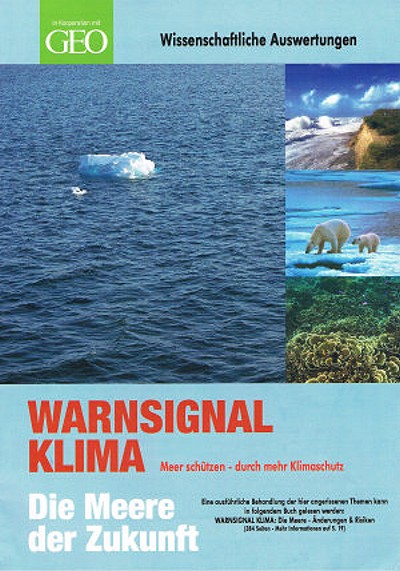 A: This GEO book series addresses water- and climate-related issues put together by a team of co-editors, this time together with Prof. Dr. Hartmut Graßl, former Director of the Max Planck Institute for Meteorology, and Prof. Dr. Karsten Reise, Head of the Research Station Wattenmeer in Sylt. Meanwhile, 12 volumes with about 750 articles of around 1500 scientists from nearly 500 institutions have been published. The goal was always to share the most current information about a topic that existed, but was often dispersed, with the public in a manner that is easy to understand. The key messages in the last book are that the oceans are fundamental for the CO2 cycle and that the ocean circulation is a fundamental part of the climate system on earth that is beginning to be affected by anthropogenic climate change.
A: This GEO book series addresses water- and climate-related issues put together by a team of co-editors, this time together with Prof. Dr. Hartmut Graßl, former Director of the Max Planck Institute for Meteorology, and Prof. Dr. Karsten Reise, Head of the Research Station Wattenmeer in Sylt. Meanwhile, 12 volumes with about 750 articles of around 1500 scientists from nearly 500 institutions have been published. The goal was always to share the most current information about a topic that existed, but was often dispersed, with the public in a manner that is easy to understand. The key messages in the last book are that the oceans are fundamental for the CO2 cycle and that the ocean circulation is a fundamental part of the climate system on earth that is beginning to be affected by anthropogenic climate change.
The effects are already visible: temperature increase shifts the distribution range of marine species polewards, if they can move. It threatens the survival of corals and other tropical species living near their maximum temperature tolerance. Acidification adds stress to organism with calcareous skeletons (corals, many plancton algae, molluscs and others) which we are only starting to explore. Warming and intensification of water cycles we are provoking has many other effects that will impact our societies in profound ways, such as increasing the potential to destabilise marine permafrost leading to the release of huge quantities of methane stored as hydrates. Methane is 20 times more powerful than CO2 as a climate gas.
We also present the current state of knowledge about technological solutions to climate change, including CO2 storage under the ocean floor and iron fertilisation to increase CO2 uptake by marine algae. We show that current knowledge does not support overboarding optimism in these fixes. We also look into a maritime transport and its potential to contribute to reducing CO2 emissions as the way to keep our planet safe. But there are many more fascinating research results than I can summarise in a few minutes, but would at least acknowledge that Mundus maris also contributed to enrich the perspectives offered to the readers.
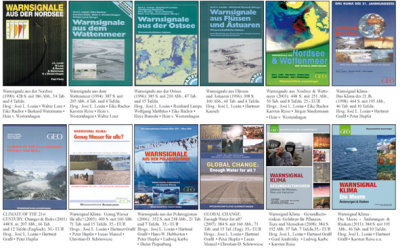 MM: You have also published an excellent brochure on climate change in time for the conference. We have already distributed a number and received some very positive feedback. How do you get this material to teachers and students? Do you already have some experience? How was the response to the conference, the book and the booklet?
MM: You have also published an excellent brochure on climate change in time for the conference. We have already distributed a number and received some very positive feedback. How do you get this material to teachers and students? Do you already have some experience? How was the response to the conference, the book and the booklet?
A: The books in this series have usually about 400 pages. After each release, a summary is prepared and published in booklet form. These booklets are completed before the symposium. The participants receive them after registration, days before the symposium to prepare. Teachers use the brochure in the classroom, so that participating students are properly prepared for the symposium. Another measure is the quality of presentations. All presenting scientists are asked to present their results and messages in a pedagogically sensible way. All these steps provide the foundation for the success of the symposia. The brochures remain current in the long term.
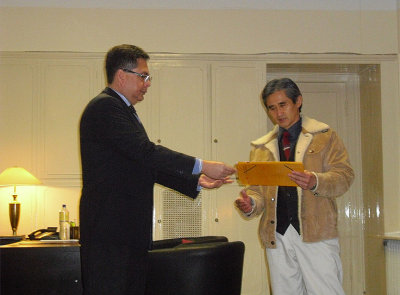
MM: You are always connected to young people and have also always demonstrated a special commitment to international cooperation.
A: Two volumes of this book series appeared in English: "The Climate of the 21st Century" and “Global Change: Enough Water for all?” With the support of the Federal Ministry for the Environment (BMU), 1000 copies were sent free of charge to appropriate institutions in developing countries as a kind of know-how transfer.
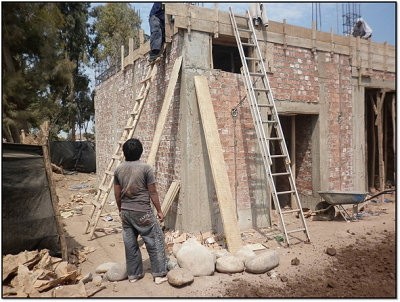 MM: After the 2007 earthquake in Peru, your home country, you have organised from your country of choice, Germany, a successful appeal for funds that allowed you to organise the generous construction of a public library in Pisco. This was a multi-year effort, but now the cultural centre is ready, including the attractive library. What is the next step?
MM: After the 2007 earthquake in Peru, your home country, you have organised from your country of choice, Germany, a successful appeal for funds that allowed you to organise the generous construction of a public library in Pisco. This was a multi-year effort, but now the cultural centre is ready, including the attractive library. What is the next step?
A: In order to help the city of Pisco (Peru) after the catastrophic earthquake in August 2007 to rebuild, we in Hamburg started the project "Reconstruction of the central school library."
The drawings were made in collaboration with the University PUCP (Pontificia Universidad Católica del Perú) in Lima. Meanwhile, the building is finished.
The next stage is the organisation and equipment. Thanks to a collaboration with the Lions Club of Germany we have US$ 150,000 at our disposal. However, there are new problems, because the mayor wants to use the building for another purpose.
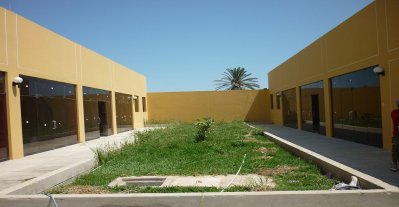 MM: We are happy as Mundus maris to contribute further to the original reconstruction project and donate the Spanish series of 10 Darwin posters for Latin America for the Library. We will also ask the IMARPE to donate 20 or 30 fish Chikipez rulers for teaching, so that the knowledge on minimum lengths at which commercial fish species reproduce becomes better known to the young people and they can become familiar with concepts of sustainable fishing in this coastal city. Thank you for the interview.
MM: We are happy as Mundus maris to contribute further to the original reconstruction project and donate the Spanish series of 10 Darwin posters for Latin America for the Library. We will also ask the IMARPE to donate 20 or 30 fish Chikipez rulers for teaching, so that the knowledge on minimum lengths at which commercial fish species reproduce becomes better known to the young people and they can become familiar with concepts of sustainable fishing in this coastal city. Thank you for the interview.
Cornelia E. Nauen asked the questions for Mundus maris.
Read on for a flavour from the 3rd Climate Week in Hamburg, 23-30 September 2011.









